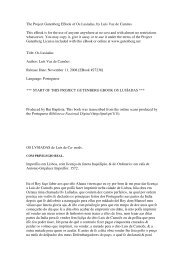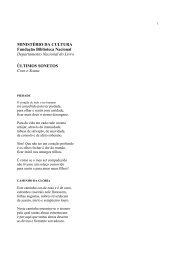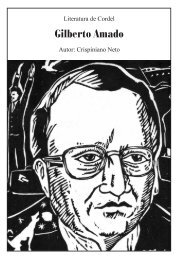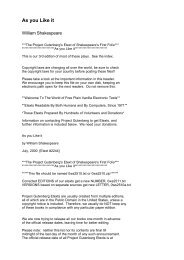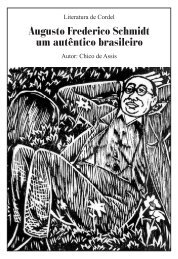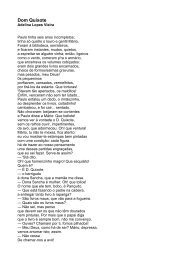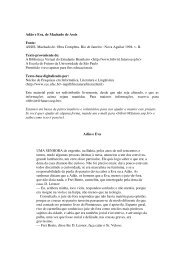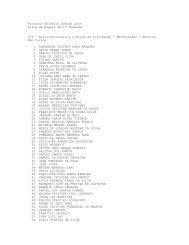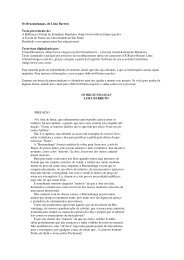You also want an ePaper? Increase the reach of your titles
YUMPU automatically turns print PDFs into web optimized ePapers that Google loves.
who, obnoxious to Napoleon for the share he had taken in Moreau's plot, lived secretly<br />
in the house, and from an old priest named Larivière, who came every day to teach the<br />
three brothers. There too he p<strong>la</strong>yed in the garden with the little Adèle Foucher, who<br />
afterwards became his wife. But this quiet home life did not <strong>la</strong>st long. In 1811 Madame<br />
Hugo set off to join her husband at Madrid, and the boys went with her. At Madrid they<br />
were sent to a school kept by Priests where Victor was not very happy, and from which<br />
he got small profit. Next year the whole family returned to Paris, and in 1815, at the age<br />
of thirteen, he was definitely sent to a boarding-school to prepare for the École<br />
Polytechnique. But his was a precocious genius, and he devoted himself, even at school,<br />
to verse-writing with greater ardour than to study. He wrote in early youth more than<br />
one poem for a prize competition, composed a romance which some years <strong>la</strong>ter he<br />
e<strong>la</strong>borated into the story Bug-Jargal, and in 1820, when only eighteen, joined his two<br />
brothers, Abel and Eugène, in publishing a literary journal called Le Conservateur<br />
Littéraire. About the same time he became engaged to Adèle Foucher, and wrote for her<br />
the romance of Han d'Is<strong>la</strong>nde, which, however, was not published till <strong>la</strong>ter. In 1822 he<br />
and Adèle were married, and in the same year he published his first volume of O<strong>des</strong>. He<br />
was now fully <strong>la</strong>unched on a literary career, and for twenty years or more the story of<br />
his life is mainly the story of his literary output. In 1827 he published his drama of<br />
Cromwell, the preface to which, with its note of defiance to literary convention, caused<br />
him to be definitely accepted as the head of the Romantic School of poetry. Les<br />
Orientales, Le dernier jour d'un condamné, Marion de Lorme, and Hernani followed in<br />
quick succession. The revolution of 1830 disturbed for a moment his literary activity,<br />
but as soon as things were quiet again he shut himself in his study with a bottle of ink, a<br />
pen, and an immense pile of paper. For six weeks he was never seen, except at dinnertime,<br />
and the result was Notre-Dame de Paris. During the next ten years four volumes<br />
of poetry and four dramas were published; in 1841 came his election to the Academy,<br />
and in 1843 he published Les Burgraves, a drama which was less successful than his<br />
former p<strong>la</strong>ys, and which marks the close of his career as a dramatist. In the same year<br />
there came to him the greatest sorrow of his life. His daughter Léopoldine, to whom he<br />
was deeply attached, was drowned with her husband during a pleasure excursion on the<br />
Seine only a few months after their marriage.<br />
In 1845 Hugo began to take an active part in politics. Son of a Vendean mother, he had<br />
been in early life a fervent royalist, and even in 1830 he could write of the fallen royal<br />
family with respectful sympathy. Yet by that time his democratic leanings had dec<strong>la</strong>red<br />
themselves, and he accepted the constitutional monarchy of Louis Philippe only as a<br />
step towards a republic, for which he considered France was not yet ripe. In 1845 the<br />
king made him a peer of France, but this did not prevent him from throwing himself<br />
with all the ardour of his nature into the revolution of 1848. Divining the ambition of<br />
Louis Napoleon, he resisted his growing power, and when the Second Empire was<br />
established the poet was among the first who were exiled from France. He took refuge<br />
first in Jersey, and afterwards in Guernsey, where he lived in a house near the coast,<br />
from the upper balcony of which the cliffs of Normandy could sometimes be discerned.<br />
Thence he <strong>la</strong>unched against the usurper a bitter prose satire, Napoléon le Petit, and a<br />
still bitterer satire in verse, Les Châtiments, and there he wrote two of his greatest<br />
novels, Les Travailleurs de <strong>la</strong> Mer and Les Misérables, two of his finest volumes of<br />
poetry, Les Contemp<strong>la</strong>tions, the greater part of the first series of La Légende <strong>des</strong> Siècles,<br />
and the two remarkable religious poems, Dieu and La Fin de Satan. He returned to<br />
France on the fall of Napoleon in 1870, to be for fifteen years the idol of the people,<br />
who regarded him as the incarnation of the spirit of liberty. Several volumes of poetry




